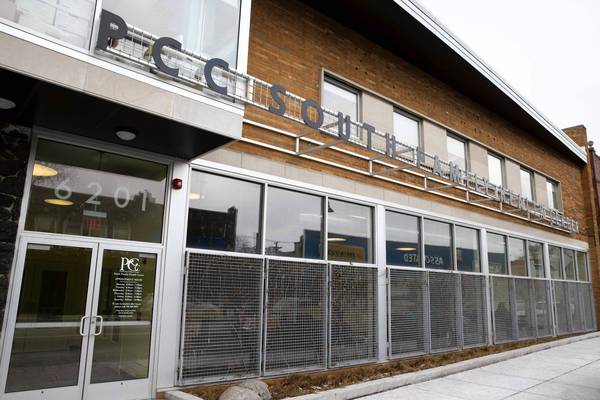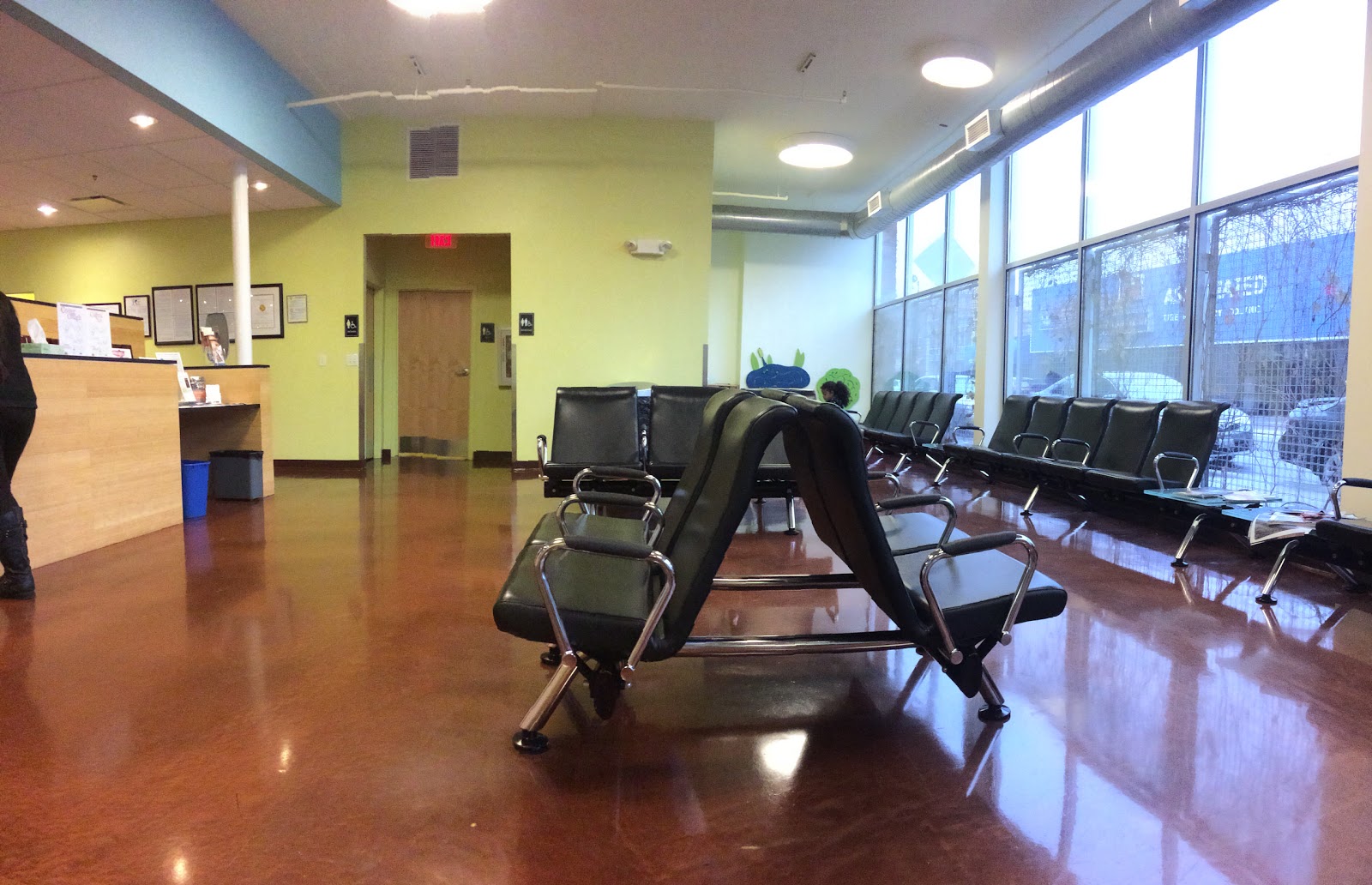Overview
PCC Community Wellness Center - South Family Health Center is a substance abuse treatment center for people seeking treatment near Cook County. As part of their treatment modalities for recovery, PCC Community Wellness Center - South Family Health Center provides cognitive behavioral therapy, telemedicine/telehealth therapy, and substance use disorder counseling during treatment. PCC Community Wellness Center - South Family Health Center is located in Berwyn, Illinois, accepting cash or self-payment for treatment.
PCC Community Wellness Center - South Family Health Center at a Glance
Payment Options
- Cash or self-payment
- Medicaid
- Medicare
- Private health insurance
- Federal, or any government funding for substance use treatment programs
Assessments
- Screening for tobacco use
- Comprehensive mental health assessment
- Comprehensive substance use assessment
- Outreach to persons in the community
- Screening for mental disorders
Age Groups
- Young adults
- Adults
Ancillary Services
- Case management service
- Integrated primary care services
- Early intervention for HIV
- Mental health services
- Transportation assistance
Accreditations
The Joint Commission:

The Joint Commission, previously known as JCAHO, is a nonprofit organization that accredits rehabilitation organizations and programs. Established in 1951, its mission is to enhance the quality of patient care and showcase excellence in healthcare delivery.
National Committee for Quality Assurance (NCQA):
NCQA accreditation is a recognition and evaluation process for healthcare organizations, given by the National Committee for Quality Assurance. It measures the quality and performance of healthcare providers, insurance plans, and managed care organizations in providing quality care to their patients. The NCQA accreditation is widely recognized as a benchmark for quality in healthcare and helps consumers make informed decisions about their healthcare options.
Federally Qualified Health Center:
Federally Qualified Health Center (FQHC) accreditation is a process of evaluation and recognition by the federal government for community health centers that provide comprehensive and accessible healthcare services to underserved populations. FQHC accreditation is essential for centers to receive federal funding and to ensure that they meet standards for quality, patient-centered care.
Treatment At PCC Community Wellness Center - South Family Health Center

Conditions Treated
Alcoholism:
Alcohol addiction is when a person becomes physically and mentally dependent on alcohol, leading to mood swings, impulsive actions, intense cravings, and withdrawal symptoms. Treatment includes supervised detox, therapy, and support groups. It's important to note that rehabilitation doesn't "cure" alcoholism, but it helps individuals better manage their addiction, regain their ability to function in daily life, and improve their overall well-being.
Mental health treatment:
Mental health services are essential during treatment for drug and alcohol addiction, whether you receive treatment in an inpatient or outpatient setting. While receiving inpatient care, you can expect to have round-the-clock access to mental health therapists and medical staff. Additionally, you will likely receive a number of different therapies and mental health options like individual and group counseling, addiction and relapse prevention education, and coping skills training.
Substance use treatment:
Substance use rehabilitation embodies a holistic treatment approach crafted to assist individuals contending with drug or alcohol addiction. This all-encompassing rehabilitation strategy encompasses two crucial components: initially addressing the physical dependency, frequently commencing with detoxification, and subsequently confronting the psychological triggers through a diverse array of therapeutic methods. The overarching objective is to empower individuals to achieve and maintain sobriety while equipping them with essential skills and coping mechanisms for a successful reintegration into society and a life free from substance abuse.
Co-occurring Disorders:
Dual-diagnosis rehabilitation centers focus on treating individuals with simultaneous mental health and substance use disorders. The intertwined nature of addiction and mental health issues can intensify each other's symptoms, complicating recovery. These centers provide a holistic treatment strategy addressing both conditions together, often encompassing thorough evaluations, a blend of therapeutic methods, family counseling, and post-treatment care.

Levels Of Care
Outpatient:
Outpatient treatment in a rehab center offers structured therapeutic services for individuals seeking recovery without full-time residential admission. Unlike intensive outpatient programs, which demand more frequent and longer sessions, standard outpatient care provides a more flexible approach, allowing participants to maintain daily activities and responsibilities while undergoing treatment.
Outpatient methadone/buprenorphine or naltrexone treatment:
Buprenorphine, sold under brand names such as Subutex, is a drug used to address opioid addiction. It can lessen or significantly diminish withdrawal effects, making the cessation of opioid use more manageable. Frequently paired with naloxone, the dosage is tailored to each person's specific needs. Some individuals prefer prolonged buprenorphine use, while others gradually decrease their dosage with the aim of ceasing its consumption.
Regular outpatient treatment:
Regular outpatient treatment is a structured program that supports individuals in overcoming addiction while allowing them to maintain their daily lives. It includes therapy, counseling, and education, making it ideal for those with mild to moderate substance use disorders or in later recovery stages. This approach helps individuals build coping skills, manage triggers, and stay substance-free while staying connected to their communities and families.
Aftercare:
Finishing a drug or alcohol rehab program is not the conclusion of substance abuse treatment but rather a pivotal step toward long-term recovery. Aftercare encompasses devising a sustainable recovery plan coupled with enduring support. It may include sober living environments such as halfway houses, career counseling, and connecting patients with community support programs like Alcoholics Anonymous (AA) or Narcotics Anonymous (NA). This holistic approach ensures a smooth transition into a substance-free life while bolstering resilience against relapse.

Treatment Modalities
Cognitive behavioral therapy:
Cognitive Behavioral Therapy (CBT) is a evidence-based psychological treatment that focuses on identifying and challenging negative thought patterns and behaviors. It aims to develop coping strategies and promote healthier thinking to address a variety of mental health issues, such as depression, anxiety, and stress. CBT is typically short-term and goal-oriented, emphasizing the role of thought processes in influencing emotions and behaviors.
Telemedicine/telehealth therapy:
Telehealth Therapy allows individuals to access mental health services remotely via secure video conferencing. This level of care offers qualified therapy from the comfort of one's home, removing geographical barriers and often reducing wait times. Ideal for those with mobility challenges, tight schedules, or those in rural areas, it combines convenience with consistent, high-quality mental health support.
Substance use disorder counseling:
Substance use disorder counseling treatment modalities refer to various approaches and methods used in the counseling and treatment of individuals with substance use problems. This can include individual therapy, group therapy, cognitive behavioral therapy, motivational interviewing, family therapy, and 12-step programs. The goal is to help the individual overcome their substance use, develop healthy coping skills, and lead a fulfilling life in recovery.
Trauma-related counseling:
Trauma-related counseling is a specialized form of therapeutic intervention aimed at assisting individuals who have experienced distressing, life-altering events. This approach focuses on helping clients process their traumatic experiences, develop coping mechanisms, and rebuild a sense of safety and trust. Counselors trained in trauma therapy use evidence-based techniques to support healing and resilience, ensuring survivors can move forward and lead fulfilling lives despite their past adversities.
Smoking/vaping/tobacco cessation counseling:
Vaping Cessation Counseling is a supportive process aimed at assisting individuals who wish to quit vaping. Through personalized sessions, trained counselors help identify triggers, manage withdrawal symptoms, and develop coping strategies. This service empowers individuals to break free from vaping addiction and work towards achieving a healthier lifestyle.
Group counseling:
Group Counseling is a therapeutic approach where individuals come together under the guidance of a trained counselor to share experiences, provide mutual support, and gain insights. It fosters a sense of community, promotes understanding through diverse perspectives, and offers personal growth and problem-solving strategies.
Family counseling:
Studies consistently show that the likelihood of sustainable recovery increases when family members are involved in rehab and substance abuse treatment. Genetic elements might influence susceptibility to drug and alcohol dependence and mental health challenges. Family interactions frequently contribute to addiction triggers. However, with the right education, family members can become pivotal support pillars during rehabilitation.
Marital/couples counseling:
Marital/couples counseling treatment modalities refer to various therapeutic approaches used to help couples resolve conflicts, improve communication, and strengthen their relationship. These modalities can include cognitive-behavioral therapy, emotionally focused therapy, solution-focused therapy, and integrative approaches. The goal of these treatments is to help couples identify and address underlying issues and develop healthy relationship dynamics.
Intervention Services:
Intervention Services are professional services aimed at addressing and amending harmful behaviors or situations, primarily in individuals struggling with addiction or other serious issues. These services guide and support both individuals and their loved ones through the intervention process, wherein a structured, solution-oriented conversation is held to encourage the individual to accept help and make positive changes towards recovery. By blending compassionate understanding with a well-formulated approach, intervention services play a crucial role in bridging the gap between acknowledgment of an issue and taking the initial steps towards resolution.
Motivational interviewing:
Motivational Interviewing (MI) in addiction treatment is a client-centered counseling style aimed at promoting behavior change by helping clients explore and resolve ambivalence. Through empathetic engagement and evoking change talk, MI empowers individuals to harness their own motivation to overcome addiction, leading to a self-directed path to recovery. This approach respects individual autonomy while supporting positive change in a compassionate, non-confrontational manner.
Anger management:
"Anger Management" refers to a set of therapeutic techniques and exercises that help individuals recognize the signs of their growing anger and take action to calm down and deal with situations in a constructive manner. It aims to reduce both emotional feelings and the physiological arousal that anger can cause, ensuring that anger does not lead to aggressive outbursts or other harmful actions. Individuals can navigate tense situations with more remarkable composure and control by understanding triggers and developing healthy coping strategies.
Relapse prevention:
The Relapse Prevention Model plays a pivotal role in the treatment of alcoholism. Utilizing a blend of Cognitive Behavioral Therapy (CBT), this model is particularly valuable for individuals who have experienced multiple relapses. Through this approach, those in recovery are equipped with essential coping skills, empowered for their journey, and guided in adopting healthier habits.
Treatment for other addiction disorder:
Treatment for other addiction disorders typically involve a combination of therapy and medication. This may include individual therapy, group therapy, and behavioral therapy. Medications may be prescribed to help manage symptoms and reduce cravings. Additionally, support groups and aftercare programs can be beneficial in maintaining recovery and preventing relapse. The treatment modality should be tailored to the individual's specific needs and circumstances.
Individual psychotherapy:
Individual Psychotherapy is a personalized therapeutic approach aimed at aiding individuals in overcoming addiction and its underlying psychological triggers. A licensed therapist works closely with the individual through one-on-one sessions to unearth and address personal challenges, emotional issues, and behavioral patterns contributing to their substance abuse. Individual psychotherapy lays a robust foundation for a sustainable recovery and a better quality of life by fostering self-awareness, coping strategies, and healthier behavioral responses.
Ancillary Services
Languages
- Spanish
Additional Services
- Pharmacotherapies administered during treatment
- Mentoring/peer support
- Drug or alcohol urine screening
Special Programs
- Clients with co-occurring mental and substance use disorders
- Pregnant/postpartum women
- Clients who have experienced trauma
Contact Information
DISCLAIMER: The facility name, logo and brand are the property and registered trademarks of PCC Community Wellness Center - South Family Health Center, and are being used for identification and informational purposes only. Use of these names, logos and brands shall not imply endorsement. BetterAddictionCare.com is not affiliated with or sponsored by PCC Community Wellness Center - South Family Health Center.



